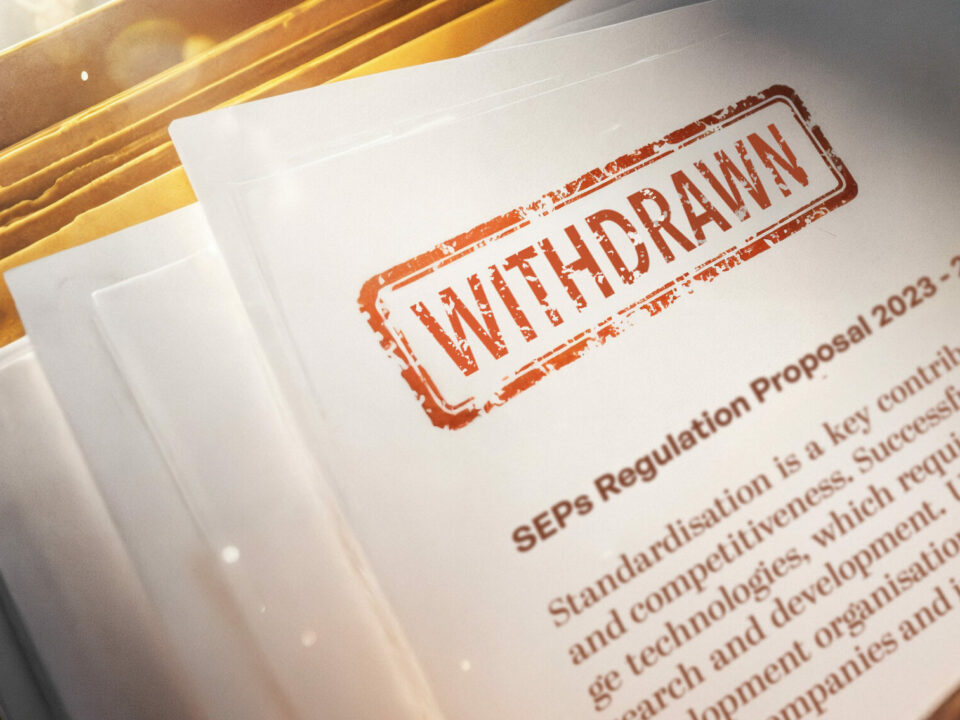IP Europe Position Paper on the European Commission’s proposal to regulate standard-essential patents (SEPs)
Standard-essential patents (SEPs)—patents which are integrated in global open standards –are instrumental to Europe’s technology leadership in several industries including mobile telephony (think: 4G, 5G, 6G, etc.) and the Internet of Things (IoT). They drive investment in R&D and the development of open standards in Europe—both of which European policymakers have long considered political imperatives.
IP Europe supports the European Commission’s stated objectives of greater transparency, balance and efficiency in the SEPs licensing ecosystem.
Fundamental flaws
Unfortunately, the Commission’s proposed SEP regulation is flawed in several fundamental respects, and in our view, as technology developers, experienced licensors and licensees, it will not achieve the Commission’s objectives. Worse, it will have the unintended consequences of harming technology innovators and SMEs and damaging the EU’s leadership in the development of vital global technologies. Given this, we believe that the Commission should withdraw the SEPs proposal and conduct a thorough assessment of its detailed proposals before tabling any new proposal.
Here are just a few of the most problematic issues with the Commission’s SEPs proposal:
- It disregards market realities: It exaggerates the impact and risk of patent litigation, overlooks the thorough and thoughtful recommendations of the Commission’s own Joint Research Centre and other departments, and ignores much of the findings of its own studies. There is no conclusive empirical evidence to justify the proposed regulation.
- It is disproportionate: None of the Commission’s objectives justify a radical regulatory intervention on this scale, which would hugely impact innovators’ return on their R&D investment through licensing revenue and block licensors’ access to court when needed. The proposed regulation introduces higher costs, complexity and uncertainty for the operation of the market, especially when it comes to SMEs. The objectives can be better and more easily achieved by building on current EU, Member State and industry initiatives – and therefore with lower societal cost and better coherence with other EU strategic objectives of fostering innovation and promoting SME participation in standards development.
- Above all, it is misconceived: The Commission’s SEPs proposal would fail to achieve its stated objectives, violate the EU’s international commitments on intellectual property (including the EU’s commitments in the Charter of Fundamental Rights and the WTO’s TRIPs agreement to protect intellectual property), and could have serious unintended consequences:
- It would be detrimental to European interests such as undermining the EU’s competitiveness and technology sovereignty, increasing wider societal costs, increasing licensing delays and encouraging other jurisdictions to take the lead in developing technology standards. None of these have been considered in the impact assessment.
- It does not help SMEs. They would be overwhelmed with ongoing additional costs and time management obligations to ensure compliance with highly technical information and complex processes. SMEs would be disincentivised to contribute to open standards development in Europe.
- It would disadvantage all firms holding European patents. A large part of the costs would be borne by Europeans, yet the measures impact all licensors and licensees of EU SEPs wherever they may be based, attaching disadvantages to EU SEPs relative to other national patents worldwide.
- It is unbalanced. The Commission’s proposal aims to impose greater transparency on SEP holders but places no such requirements on SEP users. It also does nothing to prevent situations in which unwilling licensees “hold out” against paying license fees, often for many years, until a court orders them to pay. In fact, the proposal encourages delay tactics.
- It undermines both European national courts and the nascent Unified Patent Court in favour of a new “Competence” Centre at the EUIPO, which is an expert in trademarks and designs but has no current competence or experience in the complexities of standard-essential patenting or FRAND licensing valuation. It would deprive EU courts of their deeply competent role in providing legal guidance on SEP licensing.
- It is unrealistic both financially and timing-wise. The new EUIPO competence centre is doomed to fail because the scope of the proposal, the time needed for its implementation (2 years) and the budget estimated by the Commission are all unrealistic. As currently conceived, the SEP regulation will not be able to deliver and support a rigorous, impartial and qualitative system, thereby jeopardizing the transparency objective altogether.
- It would deprive Europe’s co-legislators of any ongoing oversight powers. The Commission’s proposal for various delegated acts would hand a significant amount of new regulatory powers to the Commission.
- It would undermine the European Telecommunication Standards Institute (ETSI) and the European companies that contribute significant resources to the standards development process—a process that has been a major contributor to Europe’s leadership in many technologies including mobile telephony standards.
Appeal to Council
Given the potential impact of the proposal, which was not fully assessed by the European Commission, we, the technology contributors to open standards, with decades of experience in standardisation, licensing in and licensing out SEPs, and with the common interest of a successful European standardisation ecosystem, strongly urge the Council to: (1) demand a thorough impact assessment of the Commission’s detailed SEPs proposals; (2) convene subject-matter experts to comment on the proposals; and (3) if necessary, ask the Commission to withdraw the entire SEPs proposal pending further review and amendments.
[Please click here for a downloadable, printable version of this position paper]




